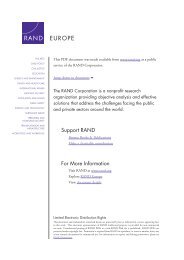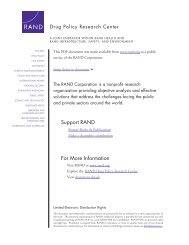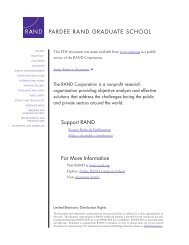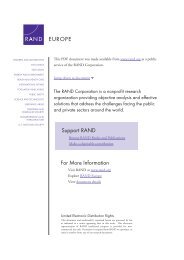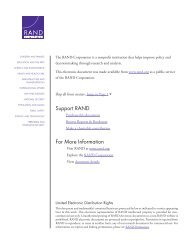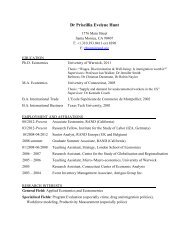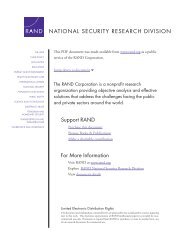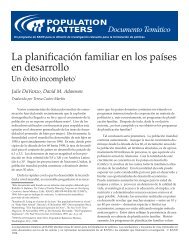The Benefits to Taxpayers from Increases in Students - RAND ...
The Benefits to Taxpayers from Increases in Students - RAND ...
The Benefits to Taxpayers from Increases in Students - RAND ...
Create successful ePaper yourself
Turn your PDF publications into a flip-book with our unique Google optimized e-Paper software.
Preface<br />
Meet<strong>in</strong>g the educational demands of the future will be expensive; however, <strong>in</strong> most<br />
states, public schools <strong>from</strong> k<strong>in</strong>dergarten through the university level already experience<br />
budgetary challenges. Policymakers face a fundamental challenge—motivat<strong>in</strong>g<br />
taxpayers <strong>to</strong> provide the funds needed <strong>to</strong> meet mount<strong>in</strong>g education needs.<br />
This report exam<strong>in</strong>es the f<strong>in</strong>ancial benefits that taxpayers realize when students’<br />
educational atta<strong>in</strong>ment is <strong>in</strong>creased. We f<strong>in</strong>d that the benefits <strong>to</strong> taxpayers <strong>from</strong> <strong>in</strong>creases<br />
<strong>in</strong> students’ educational atta<strong>in</strong>ment are very high. Regardless of a student’s gender or<br />
race/ethnicity, rais<strong>in</strong>g his or her level of education leads, on average, <strong>to</strong> substantially<br />
<strong>in</strong>creased payments <strong>in</strong><strong>to</strong>, and reduced demands on, the public budget. We consider<br />
the cost of provid<strong>in</strong>g additional education <strong>to</strong> students, although we do not explore the<br />
question of what it would cost <strong>to</strong> motivate students <strong>to</strong> stay longer <strong>in</strong> school. Our analysis<br />
<strong>in</strong>dicates that taxpayers accrue benefits <strong>from</strong> programs and policies that succeed<br />
<strong>in</strong> rais<strong>in</strong>g students’ education levels, and those benefits are entirely separate <strong>from</strong> the<br />
benefits that the students themselves ga<strong>in</strong> through <strong>in</strong>creased education. Accord<strong>in</strong>gly,<br />
taxpayers, <strong>in</strong>clud<strong>in</strong>g those who do not have children <strong>in</strong> school, have a stake <strong>in</strong> develop<strong>in</strong>g<br />
programs and policies that effectively and efficiently <strong>in</strong>crease education levels.<br />
This report’s f<strong>in</strong>d<strong>in</strong>gs should be of <strong>in</strong>terest <strong>to</strong> a broad range of policymakers,<br />
researchers, adm<strong>in</strong>istra<strong>to</strong>rs, teachers, and parents.<br />
This research was conducted with<strong>in</strong> <strong>RAND</strong> Education, a division of the <strong>RAND</strong><br />
Corporation, with support <strong>from</strong> the William and Flora Hewlett Foundation.<br />
iii




